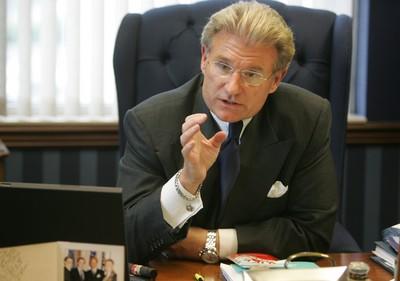‘Green’ construction bill altered
CARSON CITY -- A "green" construction bill revising tax breaks for companies building environmentally sound projects was amended by the Senate on Thursday in a way that could eliminate $12 million in revenue that was proposed to be used for a small boost in teacher pay raises.
Senate Commerce and Labor Chairman Randolph Townsend, R-Reno, who held hearings on Assembly Bill 621, offered the amendment, which passed the Senate on a voice vote.
Townsend said six projects would retain a partial sales tax exemption under the amended bill, including the Fontainebleau project on the Strip, which was identified by some lawmakers as a project that was not expected to keep the exemption.
Assembly leaders disagreed that the teacher raise has disappeared, saying it is too early to determine which projects will retain the sales tax break and which will not. It will likely take weeks after the session has ended to know for certain.
The sales taxes anticipated to be returned to the state if the Fontainebleau project does not receive the exemption are estimated at $12 million, which lawmakers sought to use to increase the 2 percent raise for teachers set for July 1 to 2.375 percent. The purpose of the raise is to cover the increased cost of the retirement contribution teachers must pay beginning July 1. The small increase would cover their share, giving teachers a full 2 percent raise rather than have the 2 percent decline to 1.625 percent.
Townsend's amendment was adopted on what appeared to be mostly party lines, with Republicans in favor and Democrats against.
Other amendments offered by Democrats, one to more dramatically restrict the sales tax exemption and another to lower the new proposed property tax breaks, were defeated.
The Senate should have a final vote on the bill today.
Projects that would receive the partial sales tax exemption in the Senate version of the bill, according to Townsend, are the CityCenter project being built by MGM/Mirage, Fontainebleau, the Venetian's Lido/Palazzo Resort projects, the Molasky Corporate Center, the Echelon Place project by Boyd Gaming and the Panorama Towers project. All are in Las Vegas.
Assemblywoman Marilyn Kirkpatrick, D-North Las Vegas, one of the lawmakers who worked on the revised measure to restrict the more generous 2005 legislation, watched the Senate debate and said the bill would likely end up in conference committee.
Assemblywoman Debbie Smith, D-Sparks, who also worked on the revised green bill, disagreed that the Senate version takes away the possibility of a teacher raise.
The bill providing a "trigger" to provide the raise once sales tax revenues have been received can still be put in place, she said.
Smith said those projects seeking the breaks would have to apply to the state Office of Energy and provide documentation, a process that could take several weeks after the end of the legislative session, she said.
"We crafted policy based on policy, not on who's in and who's out," Smith said. "And I think it's premature for anyone to be putting on the record who's in or who's out. I can't see from the information we have that the amendment changed anything."
Senate Minority Leader Dina Titus, D-Las Vegas, said she too remains optimistic that the sales tax money will materialize to provide the teacher pay hikes.
Lawmakers sought to revise the 2005 bill after learning that it would cost more than $900 million in sales and property tax breaks affecting local governments and the public schools.
The measure passed by the Assembly cut the costs of the construction under the LEED, or Leadership in Energy and Environmental Design, standards, by about half.
The Senate version, if the list of projects cited by Townsend is ultimately proved correct, would increase the value of the breaks from the Assembly version, although no precise number was cited.
The Senate version of the bill does cut the property tax breaks to a maximum of 35 percent for projects that would be grandfathered in under the 2005 legislation. Tax breaks of 25 percent to 35 percent of the value of the project would be available to new projects.
The property tax breaks in the original bill were for up to 50 percent for 10 years.
Property tax breaks would protect public schools budgets and would not apply to the value of the land, only improvements.
Other than the six projects listed by Townsend, the partial sales tax abatement for the costs of construction would be eliminated in the bill.
Titus asked why the Senate bill set an arbitrary date of Feb. 1, 2007 as one of the criteria for companies to qualify for the sales tax exemption, since the original legislation specified a window to apply of Oct. 1, 2005 to Dec. 31, 2005.
"So why are you extending the sales tax break to people who applied beyond that window," she said. "That sales tax was very clearly limited to three months."
Townsend said the date was selected because a number of companies applied before that date for the green tax breaks, then there was a flurry of activity much more recently. It was the most defensible date from a legal perspective, he said.
Although lawmakers may disagree about how a new green construction bill should be crafted, the Legislature is expected to pass some form of a bill because of concerns about the financial implications of the 2005 legislation. That bill would remain in effect unless the Legislature acts.
2007 Nevada Legislature






















